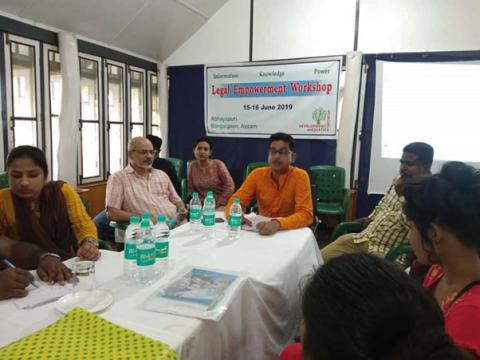A crisis of citizenship has been brewing in Assam for several decades now and new developments in the past decade that unfolded in the state are likely to result in mass statelessness. Those most affected by the continued attempts of the state to brand people as ‘foreigners’ or ‘illegals’ belong to the minority Bengali ethnicity, a group which faces severe challenges in the economic, social and cultural spheres of life. They live on remote river bank villages and ecologically unstable river islands forcing them to relocate their houses frequently due to floods and river erosion. Most are unable to read and write and understand the notices they get and the documents they need to prove their citizenship. As a result of these factors, millions of lives are endangered, suspended and rendered precarious. This community is being systematically stripped of their citizenship and other rights and their dignity in clear violation of constitutional morality and human rights principles.
The main state agency through which this stripping away of citizenship of minority populations in Assam occurs is through a quasi-judicial body called the Foreigners Tribunal (FT). Set up in 1964, this body adjudicates cases of alleged ‘illegal migrants’ that come through the Border Police or the Election Commission. So far, according to the Assam government, more than 143,000 have been declared foreigners. Following the implementation of the National Register of Citizens (NRC) and its publication in August 2019, there is a risk that the 2 million people who have been left out will have to now present evidence of their citizenship before these Tribunals.
DAJI’s programs on protection of the rights of citizenship of minorities includes facilitating legal aid to people whose citizenship is challenged by agencies. We work with Paralegal Volunteers (PLVs) and lawyers to support the vulnerable individuals and families in preventing loss of citizenship. We also support the marginalised communities in their access to social security, health and education services.
DAJI conducts documentation and research into issues around the risk of statelessness in Assam. DAJI is also a part of regional and global coalitions to prevent and address statelessness. Please check our section on publications for research reports on NRC and citizenship contestation issues.
DAJI is also a part of Right to Nationality and Citizenship Network which is a coming together of lawyers, researchers, media persons and activists to advocate for the right to nationality as a human right. The Network has produced documentation on the impact of deprivation of citizenship in Assam.
2022-23 programs -
DAJI continues to support vulnerable people to prevent the stripping away of their citizenship rights through our work with PLVs and lawyers.
Given the situation where vulnerable individuals and families are charged as ‘illegal foreigners’, they find it difficult to navigate the law and legality. Key players in this regard are paralegals, who act as intermediaries between litigants, the lawyers and the state. As persons hailing from these communities and with some education, they work in a voluntary capacity in supporting the documentary needs of litigants, and assist them with the legal process from start to finish. Paralegals have a baseline awareness of the law, governance and the obligations of the state. Thus, they are able to facilitate legal aid and create legal awareness among affected communities as well as bring their cases to advocates who are willing to take up these matters, thereby bridging the wide gap between lawyers and clients. PLVs are key players in DAJI’s programs in Assam.
The organisation is also conducting research into the functioning of the FTs and documenting experiences of litigants and lawyers. Audio testimonials of the stakeholders will demonstrate how there is discrimination and arbitrariness in the functioning of FTs.

